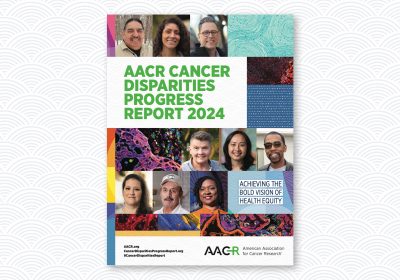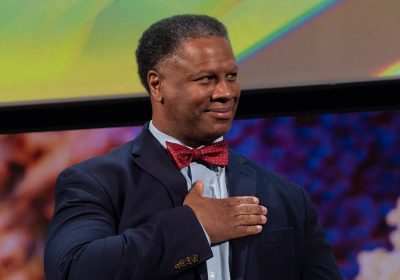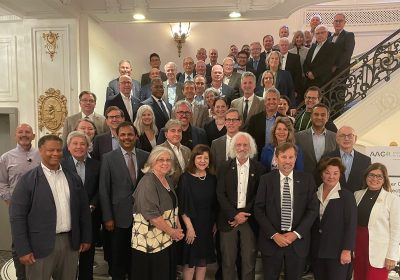
Cultivating the Next Generation of Cancer Researchers
AACR expands its roster of programs for high school and undergraduate students.
The next great cancer researchers may be sitting in a high school biology class or an undergraduate chemistry lecture right now. But rather than waiting for them to graduate, complete an advanced degree, and join the field on their own, the American Association for Cancer Research® (AACR) proactively reaches out to these aspiring scientists and helps show them the path to a career in cancer research.
Supporting these up-and-coming researchers is the job of the AACR Science Education and Career Advancement Committee, chaired by Brian M. Rivers, MPH, PhD, a professor of community health and preventive medicine and director of the Cancer Health Equity Institute at Morehouse School of Medicine in Atlanta. The committee provides high school, undergraduate, and postbaccalaureate students with education and training through exclusive opportunities that expose them to the latest in cancer research, according to Dr. Rivers.
One of the AACR’s largest student education programs is the Undergraduate Student Caucus and Poster Competition, which occurs at the AACR Annual Meeting. More than 250 undergrads who are actively involved in cancer research present their work, compete for monetary prizes, and meet like-minded peers. “It just gives them an experience that, I think, not one of them can ever forget,” Dr. Rivers said.
The committee selects 10 to 12 of the participants to be Undergraduate Scholars. These students receive complimentary registration for the Annual Meeting and $1,500 to cover travel expenses. During the meeting, experts advise the scholars on which sessions to attend, and the AACR honors the students at a celebratory luncheon. Beyond the meeting, Undergraduate Scholars join quarterly virtual professional development workshops on topics like networking, writing a personal statement, and developing a professional social media presence. “While it’s good to focus on the science … there’s so much more that has to be attended to professionally,” Dr. Rivers said.
Undergraduates weren’t the only students at the AACR Annual Meeting 2025 from April 25 to 30 in Chicago, as a record number of high school students also descended upon the conference. The AACR offers the Special Program for High School Students each year at both the Annual Meeting and the AACR Conference on The Science of Cancer Health Disparities. For the 2025 Annual Meeting, the AACR worked with three cancer centers in the Chicago area and the Chicago Public Schools to attract nearly 350 students, according to Dr. Rivers. These teens attended lectures from researchers and patient advocates, took a tour of the convention center, participated in a networking luncheon, and presented their work in a student poster session. New at this year’s Annual Meeting, students also listened to a panel discussion on how to prepare for a career in cancer research and took part in an experiment where they used microscopes to observe molecular changes in fruit flies.
The AACR also promotes student research by attending high school science fairs near the organization’s Philadelphia headquarters. Representatives speak with students about educational opportunities, and the organization sponsors prizes for winners. “It’s really an opportunity just to show support for the scientific process, for research,” Dr. Rivers said. He recalled how his own experience in science fairs helped encourage him to pursue a career in cancer research. “We know the importance of these early exposures,” he said.
Additionally, the committee is launching an immersive summer research opportunity called the AACR Cancer Research Education for Success (CARES) High School Scholars Program. The AACR plans to sponsor chances for students to conduct hands-on research at a local cancer center. A steering committee will be created in summer 2025, according to Dr. Rivers. He said the goal is to release a call for applications to cancer centers in fall 2025 and have students start the program in summer 2026.
The AACR Science Education and Career Advancement Committee designs all these programs to introduce students to the wide breadth of jobs in cancer research and provide them with the professional skills needed to succeed in the field, according to Dr. Rivers. “We want to make sure that we’re intentionally growing the next generation of leaders,” he said.





